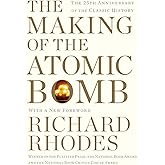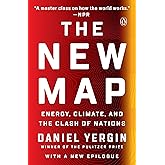
Download the free Kindle app and start reading Kindle books instantly on your smartphone, tablet, or computer - no Kindle device required.
Read instantly on your browser with Kindle for Web.
Using your mobile phone camera - scan the code below and download the Kindle app.



 Audible sample
Audible sample Energy: A Human History Hardcover – May 29, 2018
People have lived and died, businesses have prospered and failed, and nations have risen to world power and declined, all over energy challenges. Ultimately, the history of these challenges tells the story of humanity itself.
Through an unforgettable cast of characters, Pulitzer Prize-winning author Richard Rhodes explains how wood gave way to coal and coal made room for oil, as we now turn to natural gas, nuclear power, and renewable energy. Rhodes looks back on five centuries of progress, through such influential figures as Queen Elizabeth I, King James I, Benjamin Franklin, Herman Melville, John D. Rockefeller, and Henry Ford.
In Energy, Rhodes highlights the successes and failures that led to each breakthrough in energy production; from animal and waterpower to the steam engine, from internal-combustion to the electric motor. He addresses how we learned from such challenges, mastered their transitions, and capitalized on their opportunities. Rhodes also looks at the current energy landscape, with a focus on how wind energy is competing for dominance with cast supplies of coal and natural gas. He also addresses the specter of global warming, and a population hurtling towards ten billion by 2100.
Human beings have confronted the problem of how to draw life from raw material since the beginning of time. Each invention, each discovery, each adaptation brought further challenges, and through such transformations, we arrived at where we are today. In Rhodes’s singular style, Energy details how this knowledge of our history can inform our way tomorrow.
- Print length480 pages
- LanguageEnglish
- PublisherSimon & Schuster
- Publication dateMay 29, 2018
- Dimensions6 x 1.4 x 9 inches
- ISBN-101501105353
- ISBN-13978-1501105357
Book recommendations, author interviews, editors' picks, and more. Read it now
Customers who viewed this item also viewed
Editorial Reviews
Review
“Rhodes doesn’t minimize the downsides of advances, both human and environmental, yet, on the whole, this is a beautifully written, often inspiring saga of ingenuity and progress, ideal for general readers. Immensely engaging, trusted, and best-selling, Rhodes will attract the usual avid interest as he brings facts, context, and clarity to a key, often contentious subject.”—BOOKLIST, Starred Review
“Once again, Pulitzer Prize-winning historian and author Richard Rhodes takes on entangled issues around the use of science and technology and makes complicated matters more approachable. Rhodes’s study will appeal to many, not just technophiles. As always, he is an exceptionally engaging writer.”—Library Journal, Starred Review
“In this meticulously researched work, Rhodes brings his fascination with engineers, scientists and inventors along as he presents an often underappreciated history: four centuries through the evolution of energy and how we use it.”—The New York Times Book Review
“Riveting…Mr. Rhodes has scored another masterpiece.”—The Wall Street Journal
“Energy is both a work of history and a passionately written moral tale...Rhodes’s hope that a critical look at past energy technologies will benefit those of the future is heartening.”—Science Magazine
“Rhodes delivers brilliantly on the inner workings of steam engines and reactors, and his lively narrative takes readers on thrilling side trips... His fascinating tale will delight technology wonks and particularly appeal to inventors and discoverers.”—Publisher’s Weekly
“Energy is an excellent book that manages to be both entertaining and informative, and it's likely to appeal to both science fans and those of us who only passed physics by the skin of our teeth. It's also a powerful look at the importance of science.”—NPR.ORG
“Richard Rhodes’ dazzling Energy: A Human History tells a compulsively readable tale of human need, curiosity, ingenuity and arrogance... This exceptional book is required reading for anyone concerned about the human impact on the future of the world.”—Bookpage
About the Author
Product details
- Publisher : Simon & Schuster; First Edition (May 29, 2018)
- Language : English
- Hardcover : 480 pages
- ISBN-10 : 1501105353
- ISBN-13 : 978-1501105357
- Item Weight : 1.4 pounds
- Dimensions : 6 x 1.4 x 9 inches
- Best Sellers Rank: #416,877 in Books (See Top 100 in Books)
- #57 in Electric Energy
- #138 in Oil & Energy Industry (Books)
- #554 in Environmental Economics (Books)
- Customer Reviews:
About the author

Richard Rhodes is the author of 25 works of history, fiction and letters. He's a Kansas native, a father and grandfather. His book The Making of the Atomic Bomb won a Pulitzer Prize in Nonfiction, a National Book Award and a National Book Critics Circle Award. He lectures widely on subjects related to his books, which run the gamut from nuclear history to the story of mad cow disease to a study of how people become violent to a biography of the 19th-century artist John James Audubon. His latest book is Hell and Good Company, about the people and technologies of the Spanish Civil War. His website is www.RichardRhodes.com.
Customer reviews
Customer Reviews, including Product Star Ratings help customers to learn more about the product and decide whether it is the right product for them.
To calculate the overall star rating and percentage breakdown by star, we don’t use a simple average. Instead, our system considers things like how recent a review is and if the reviewer bought the item on Amazon. It also analyzed reviews to verify trustworthiness.
Learn more how customers reviews work on AmazonCustomers say
Customers find the book provides a good explanation of energy and power from pre-industrial times. They find it a worthwhile read and valuable for anyone who wants to understand the science. The writing quality is described as detailed, easy to read, and lucid. Readers appreciate the interesting history and personal perspectives on the geniuses who pushed the technology. The style is described as thoughtful and colorful, with accurate and factual information.
AI-generated from the text of customer reviews
Customers find the book informative and well-written about energy. It provides an excellent explanation of the evolution of energy and power from pre-industrial times. The author does a good job providing concepts and historical descriptions of human energy utilization and transformations over the last few hundred years. The book reviews the history of several sources of energy. Readers appreciate the careful research and clear writing style. While some find the subject interesting, others mention it can be tedious at times with its detail.
"Richard Rhodes is well known for careful research and clear writing in his several non-fiction books. This book is no exception...." Read more
"...This book has many such features which I’m sure would aid in comprehending the material, if only they were rendered at a size larger than my little..." Read more
"...behind the climate change theory and the realities about energy production and usage that you will have difficulty finding told in such an..." Read more
"I enjoyed this book because the premise was very appealing, and looked forward to it since Rhodes' "Making of ...." was one of the best books I have..." Read more
Customers find the book readable and engaging. They say it's a valuable read about the challenges facing nuclear power. The book starts out well with interesting details about the industrial process and does a good job of looking at the upsides and downsides.
"...The topic is timely, and the book is valuable." Read more
"...Despite these qualms this is a valuable book regarding the challenges facing humanity as we seek solutions to energy development and maintenance." Read more
"I've read several Rhodes books and this one is as good as any. Rhodes writes at a different level than most authors...." Read more
"The book is excellent. It explains our energy past to elucidate our energy present and future. And it’s quite well written...." Read more
Customers find the book's writing clear and easy to understand. They appreciate the detailed explanations and narrative style. The author provides valuable history and accessible information in a manner accessible to most readers. Overall, customers describe the book as comprehensive and well-written.
"...it particularly interesting is his customary and illuminating use of narratives about individuals to illustrate the larger historical movements that..." Read more
"...amounts of information, digest them and present them in a manner accessible to most readers...." Read more
"...He makes complex subjects understandable. I read this book in five days and couldn't put it down." Read more
"...Mr. Rhodes last chapter is so poorly written and full of misinformation on renewable energy that it destroys his credibility as an energy expert...." Read more
Customers find the book's history engaging. It provides a thorough account of modern society's various energy uses and developments. They appreciate the interesting details about the industrial revolution and the rise of energy use. The book is described as readable on a complex subject with a great premise.
"...The topic is timely, and the book is valuable." Read more
"...Good history in the front end, advertisment for nuclear power on the back end." Read more
"...and highly readable, indeed engrossing with many fascinating vignettes about historical events that shaped energy markets...." Read more
"I enjoyed this book and found it interesting. I believe it should really have been called "Fuel" instead of energy...." Read more
Customers enjoy the book's style. They find it thoughtful and engaging, with personal insights into the geniuses and characters who pushed the technology and science forward. The journey from the beginnings of humankind is detailed and colorful.
"...It delightfully includes personal looks at the geniuses and characters who pushed the technology/science forward...." Read more
"A colourful and detailed journey from the beginnings of human appreciation of “Energy v’s Magic” though to today’s appreciation of “Energy v’s..." Read more
"Far reaching; great clarity and style. I only wished that he would have taken a more expansive look at renewable energy." Read more
"Thoughtful look at the history of man's use of energy...." Read more
Customers find the book accurate and well-written. They describe it as factual and hard-headed.
"...His books, especially about nuclear issues, seem accurate and are well written. I skipped the virus books...." Read more
"Factual and Hard Headed..." Read more
"Clear, accurate, interesting history of energy..." Read more
Reviews with images
A New Perspective
Top reviews from the United States
There was a problem filtering reviews right now. Please try again later.
- Reviewed in the United States on August 15, 2018Richard Rhodes is well known for careful research and clear writing in his several non-fiction books. This book is no exception. What makes it particularly interesting is his customary and illuminating use of narratives about individuals to illustrate the larger historical movements that he describes. Happily, the book is well documented so that the reader may follow up on details without excess searching for references. The topic is timely, and the book is valuable.
- Reviewed in the United States on March 7, 2022Richard Rhodes has an amazing capacity to digest enormous amounts of information, digest them and present them in a manner accessible to most readers. This book is an excellent read about how energy use has progressed from wood to coal to oil, natural gas and on to nuclear and renewables. My one caveat and major disagreement with his presentation is that he veers off into propaganda for the nuclear industry and fatuously optimistic projections about how the world will continue to progress in the face of massive overpopulation and resource depletion. He ignores the dangers of nuclear terrorism, nuclear warfare and the incompetence of nuclear energy companies. As well he seems to have read nothing about our destruction of the oceans, atmosphere and agricultural resources. Despite these qualms this is a valuable book regarding the challenges facing humanity as we seek solutions to energy development and maintenance.
- Reviewed in the United States on June 16, 2024I've read several Rhodes books and this one is as good as any. Rhodes writes at a different level than most authors. He makes complex subjects understandable. I read this book in five days and couldn't put it down.
- Reviewed in the United States on July 16, 2018The book is excellent. It explains our energy past to elucidate our energy present and future. And it’s quite well written.
However, don’t buy this or any other book with graphs, photos, or illustrations on the Kindle app. This book has many such features which I’m sure would aid in comprehending the material, if only they were rendered at a size larger than my little fingernail. As it stands, it is impossible to even see what most of the diagrams and photos are meant to convey. And yes, I tried to no avail to enlarge them.
Amazon really needs to fix this. For now, though, I’d advise folks to avoid trying to read even marginally technical books on the Kindle app.
- Reviewed in the United States on August 21, 2018This is kind of a wonky look at the advance of the means of producing energy since the use of wood. It delightfully includes personal looks at the geniuses and characters who pushed the technology/science forward. It also explores the science behind the discoveries a little to in depth for this reader. But heh, I got through it and maybe a little smarter for it.
The main premise of the book, is that each new step in the evolution of energy was slow to catch on in the market, but eventually would become the dominate source of energy. Rhode then makes the case that nuclear power, although hindered in development by scaredy pants environmentalist will eventually become the clean energy engine that will save the world. Although we have had three nuclear accidents, two of which left large swaths of the planet uninhabitable for hundreds (thousands?) of years, the were perfectly preventable. Rhodes proclaims the accidents were caused by a design flaw, (Fukushima) that was known but never corrected or human error (Chernobyl, Harrisburg). Of course human error is a thing of the past and no one would overlook a design flaw just to save money.
Good history in the front end, advertisment for nuclear power on the back end.
- Reviewed in the United States on June 24, 2019A suitable follow up for the same author's award-winning book, published 30 years ago, about the origins of the atomic bomb.
It is also a must read for anyone who wants to understand the science (and pseudo-science) behind the climate change theory and the realities about energy production and usage that you will have difficulty finding told in such an entertaining fashion anywhere else.
This book was so good that I bought it after I read it for free from a copy I borrowed from the local public library.
- Reviewed in the United States on May 5, 2019I enjoyed this book because the premise was very appealing, and looked forward to it since Rhodes' "Making of ...." was one of the best books I have ever read. BUT, it seems that Rhodes forgot to find an editor for this book; I found it full of jumbled thoughts, places where there were no transitions (or even paragraphs), and other issues that a good editor would have fixed. When one researches as richly as Rhodes does, it takes special attention to keep all the facts and relevancies organized. That detracted from my overall enjoyment. However, if you are interested in our energy past and future it is an important read.
- Reviewed in the United States on October 30, 2018Free flowing and highly readable, indeed engrossing with many fascinating vignettes about historical events that shaped energy markets. And I was pleasantly surprised this was not an ideological treatise about fossil fuels and climate change, in fact reading between the lines it seemed to me that because of their inability to be scaled without huge subsidies the author is highly skeptical about renewable sources like wind and solar, waxing instead about the lost promise of nuclear, lost because in a democracy irrational fears (in this case about radioactivity) become accepted in to the public discourse as hard fact. He probably needed to be circumspect about his skepticism of wind and solar for fear of being skewered alive on the altar of political correctness by the "climate scientist" cabal, always fearful of some counterargument to the Faith jeopardizing their research grants.....
Top reviews from other countries
 FernandoReviewed in Brazil on January 11, 2022
FernandoReviewed in Brazil on January 11, 20222.0 out of 5 stars Ok
Ok
 Joe HReviewed in the United Kingdom on July 16, 2022
Joe HReviewed in the United Kingdom on July 16, 20225.0 out of 5 stars A good review of the history of energy
I enjoyed this book. It ends with a positi
ve outlook on how humans in the past have used innovation to improve the lives. The author is hopeful that we will continue with these improvements.
 GlennReviewed in Canada on July 26, 2019
GlennReviewed in Canada on July 26, 20195.0 out of 5 stars A very good history.
Rhodes writes well and tells an important story.
-
 SANDMAN PARDILLOReviewed in Spain on October 25, 2020
SANDMAN PARDILLOReviewed in Spain on October 25, 20201.0 out of 5 stars No aporta nada
No hay ni hilo conductor ni mensajes claros, sólo un borbotón de datos que no aportan nada. Gran decepción
 PetraReviewed in Germany on October 16, 2020
PetraReviewed in Germany on October 16, 20204.0 out of 5 stars Interesting and well researched early history
Especially the early history of steam and electric power is superb. But it doesn't come up to Making of the Atomic bomb.











